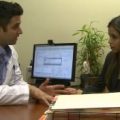
This post was written by Sarah McAfee, a former member of our team.
I am allergic to mango. Like, really allergic. I found out the hard way, and then endured a most unpleasant round of testing to confirm it. Upon telling my family the test results, a certain relative immediately shot back, “You should get a second opinion.”
Really? Anaphylaxis and a blood test isn’t enough proof anymore? When did we get so skeptical about our health care?
To be fair, his follow-up suggestion to “Go get a mango from the grocery store, park outside the ER and then eat it” would definitely be a pretty airtight (and dangerous, and expensive…) scientific experiment. There were other ingredients in that dinner, and there is a (slim) chance that my allergy test was performed incorrectly, or the results interpreted inaccurately or explained improperly. Perhaps I was naïve in trusting the health care system to determine my lifetime of fruit salad preferences. But I don’t think so.
However, questioning the health care system—providers, insurers, the government—can be a healthy activity that leads to better access and better care. Being an engaged patient and an advocate for our own health is something that absolutely leads to better outcomes. The balance, though, is learning who the experts are, when to trust them, and what to trust them about—I’m looking at you, Dr. Google.
It is interesting to me that at the same time we are questioning our providers about their diagnoses, we are, in large numbers, trusting strangers on the internet to give us their thoughts on our health care choices. A 2012 survey showed that 25% of people said they would trust health information they got through social media from people they don’t know. Would you trust a stranger on Twitter to help you make choices about your family’s health care? Would you trust a doctor who is just as much of a stranger to you?


Perhaps the cost of health care is partially to blame, since diagnosing your ailments on the internet is certainly cheaper. Perhaps it is because life moves so quickly now that we don’t feel we have time to go to the doctor’s office and would rather get second-rate (or third-rate, or tenth-rate…) information online so we can get back to our busy schedules. Perhaps we have been let down by our health care system often enough that we start to believe it is out to get us and no longer has our best interests at heart. In any case, our trust is a valuable possession that we alone control, and one we could all stand to dole out a little more wisely.
Many would say that the foundation of any good relationship is trust, and that holds true for the doctor-patient relationship just as it does a romantic relationship or friendship. You trust your partner or your best friend with your most intimate secret because you feel safe and know they will not judge you for your shortcomings. Wouldn’t it be wonderful to feel the same way about your provider? To know that you could be fully honest and vulnerable and that they are there to support you, teach you, and help you heal? It can be that way! In fact, it should be that way.
So yes, do Google those symptoms and see what pops up, but don’t self-diagnose Dengue Fever. Then go see your provider and work to build the kind of relationship you want for your health care.




